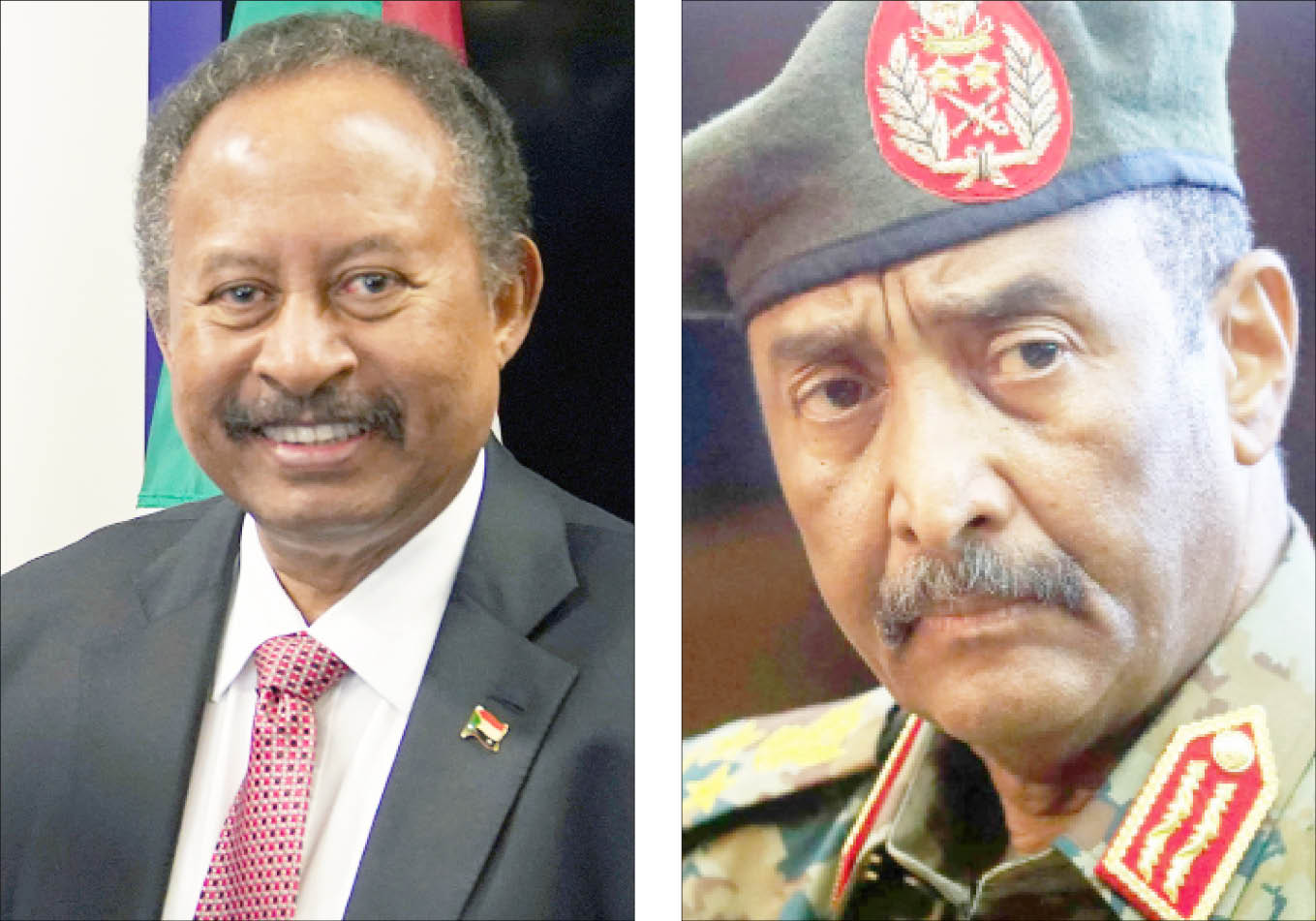Sudan needs dialogue, not coup
Since the military seized control of power last week in Sudan, large street protests have continued to rock the country’s major cities including Khartoum, the country’s capital city; the Red Sea city of Port Sudan; Kassala in eastern Sudan; and Obeid, in North Kordofan province. The protest as witnessed on Saturday October 30, 2021, was […]

Ousted Sudanese Prime minister Abdalla Hamdok and Coup leader, General Abdel Fattah al-Burhan
Since the military seized control of power last week in Sudan, large street protests have continued to rock the country’s major cities including Khartoum, the country’s capital city; the Red Sea city of Port Sudan; Kassala in eastern Sudan; and Obeid, in North Kordofan province. The protest as witnessed on Saturday October 30, 2021, was the largest pro-democracy demonstration since the military took over power early last week. The demonstrations were called by the Sudanese Professionals’ Association, which like the Resistance Committees, was at the forefront of the uprising that ended former President Omar al-Bashir’s rule in 2019.
Sudan’s General Abdel Fattah al-Burhan had on Monday, October 25, 2021, ordered the dissolution of the government and declared a state of emergency; sparking widespread international condemnations. Prime Minister, Abdalla Hamdok, along with his ministers and other civilian members of Sudan’s transitional government were placed under military arrest. Hamdok was later released under close guard, but other ministers and civilian leaders are still being held in detention. With last Saturday’s fatal shootings, a dozen protesters have, so far, been reportedly killed by security forces; leaving hundreds of others wounded.
General Burhan claims the takeover was necessary to prevent a civil war; citing what he said were growing divisions among political groups. Burhan installed himself as head of a military council that he said will rule Sudan until elections in July 2023. Pro-democracy movements in Sudan, however, fear that the military has no intention of easing its grip and would eventually appoint politicians it can control.
It would be recalled that President Omar Hassan Al-Bashir Al-Bashir, who came to power through a bloodless military coup that sacked Prime Minister Sadiq Al-Mahdi in 1989, was ousted in 2019 after a 30-year rule. Following four months of persistent protests that began on December 19, 2018 over the increase in the price of bread, massive unemployment, lack of food security and general misery in the country, the protesters defied threats of violence, a state of emergency and cabinet reshuffle by Al-Bashir. The occupation on April 6, 2019 of Al-Bashir’s residence by the protesters, in their large numbers, led to his ouster. A new government, which initiated a transition to democratic rule in Sudan was thereafter formed.
In strong condemnation of the coup, the African Union suspended Sudan until a civilian-led transitional authority is restored in the country. The United States of America said it was “deeply alarmed” by reports of a military takeover in Sudan; saying “We reject the actions by the military and call for the immediate release of the prime minister and others who have been placed under house arrest.” Reacting, the UN Secretary General, Antonio Guterres said, “I condemn the on-going military coup in Sudan. There must be full respect for the constitutional charter to protect the hard-won political transition. The UN will continue to stand with the people of Sudan” The Arab League Secretary General, Ahmed Aboul Gheit has called on all Sudanese parties to fully abide by the constitutional document signed in August 2019.
We also condemn the coup in its entirety, as what Sudan needs at the moment is anything but further destabilisation. With all the condemnations that have trailed the coup, it is obvious that the General Burhan-led adventure is clearly one unpopular move that may be difficult to survive the recriminations against it. The critical reactions to the coup should convince Burhan and his military colleagues that their action is unconstitutional and will only plunge Sudan into a deeper political crisis. The coup seeks to further endanger the humble gains achieved from the on-going transition to democracy and could further exacerbate the situation in Sudan; exposing the country to more uncertainties.
While we call on the military and other security forces to exercise restraint in their handling of protesters, it is in the country’s best interest for General Burhan and his men to retreat their steps. We, therefore, call for the immediate re-instatement of the deposed transitional government and the release of all political figures from detention. No matter what the military views to be wrong with the transitional council in Sudan, dialogue not coup is the only realistic way to prevent the country from falling into another chaos. The era of coups in Africa is over and it should remain so.
